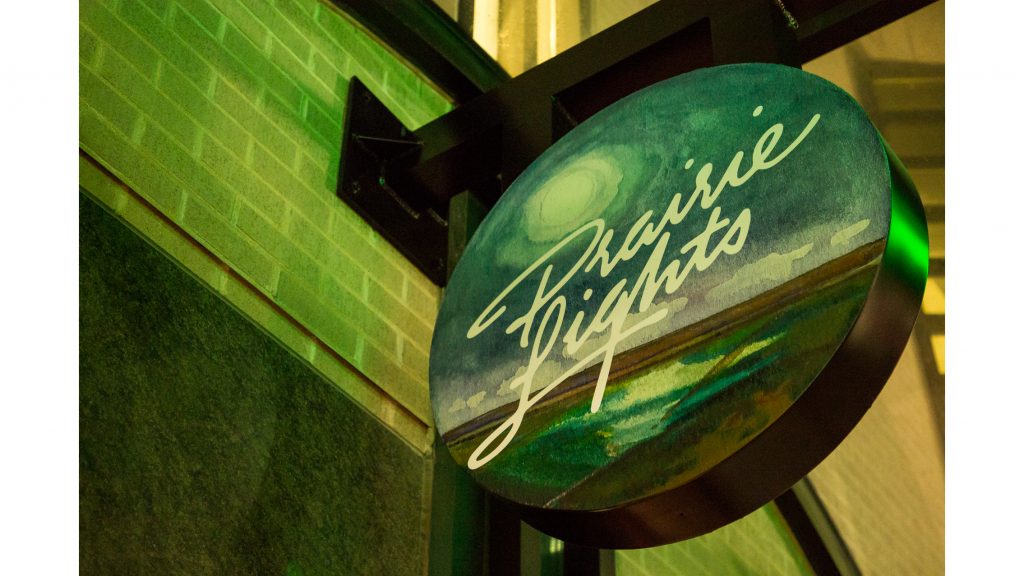‘Courting Mr. Lincoln’: A provocative interview with history
Louis Bayard will read from his novel Courting Mr. Lincoln at Prairie Lights at 7 p.m. April 29.
Prairie Lights bookstore on Monday, Nov. 13, 2017.
April 28, 2019
As one of America’s best-known presidents, Honest Abe’s story conversely has a lot of mystery. For historical fiction storyteller Louis Bayard, Abraham Lincoln holds undeniable historical significance as a result. The man went from a near-nobody to a leader trying to hold together a country in its gravest crisis, while keeping his interior away from those closest to him. Historians have ignored much of Lincoln’s story, perhaps most notably speculation about his sexuality. Louis Bayard’s novel Courting Mr. Lincoln explores this facet of Lincoln’s history and more.
Bayard’s ninth novel was released April 23. The Princeton and Northwestern graduate currently lives in Washington and teaches fiction writing at George Washington University. He will read from Courting Mr. Lincoln at Prairie Lights at 7 p.m. April 29.
After around three months of research on the 16th president, Bayard began his two-year writing process. The historical research was of the utmost importance — you have to know the ending of the story to fill in the middle, Bayard said. The book features the alleged love triangle among Abraham Lincoln, Mary Todd, and Lincoln’s confidant Joshua Speed. This queerness of Lincoln in the novel and reality serves as a point of controversy, but Bayard welcomes this and is prepared to be a fighter for Lincoln’s unexplored stories.
“My dream is to be yelled at on Fox News by Sean Hannity — it means I’m breaking through to the other side,” Bayard said. “The historians are … getting to investigate the Lincoln-Speed relationship … Fictional representations have lagged behind on that for years.”
While Speed’s relationship with Lincoln is significant, Mary Todd served as a particularly interesting project in the novel for the author. The former first lady’s youth, beauty, intelligence, passion, and aspirations for politics is often left out of historical discourse, Bayard said. He said he plans to rehabilitate Mary Todd through his book.
“She was a mentally troubled woman, but she had gifts, and I think Lincoln appreciated them,” Bayard said.
The author’s original vision for the ending was inspired by Mary Todd and Jane Austen. The endpoint of the story is like an Austen novel: The heroine gets married. However, for Mary Todd, the marriage is not an “unalloyed happiness” but more complicated, Bayard said.
The novel’s likeness to Austen’s is apparent in its honest and clear reflection of the past. This is accomplished in the book through researched and carefully positioned detail — just not too much. Bayard said research is like an interview with the past, with both importance and excess as a result. He had to have enough to write the story with a compelling beginning, middle, and end. However, he also had to jettison some embellishments. Too much detail, and it distracts from the story, which is most important, he said.
The story is told from the perspectives of Lincoln, Todd, and Speed. The many perspectives are often a draw or a push for readers, but for Bayard, it is essential to the story. Each narrator has her or his own truth, and this complicates truth itself and the way a reader views a story, Bayard said.
“It’s great fun — I feel this way about sexuality and history,” Bayard said. “[Without many perspectives], it would be incomplete.”
The author compared his story to a sculpture. As a 3D figure, a sculpture is meant to be viewed from numerous angles. This is true for story and Bayard’s in particular. Courting Mr. Lincoln is meant to take Lincoln’s story from 2D to 3D with the addition of Mary Todd and Speed.
“If you see it from one … you’re being deprived of a key perspective,” Bayard said.






